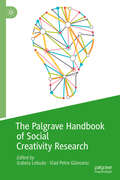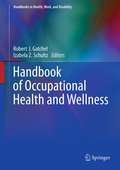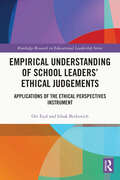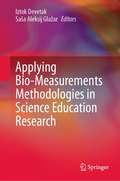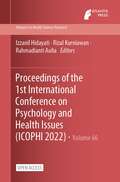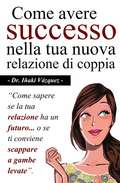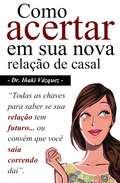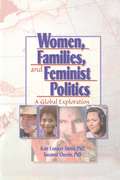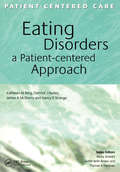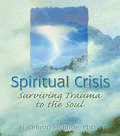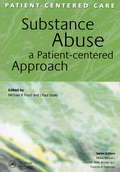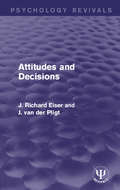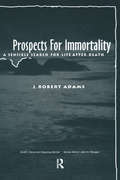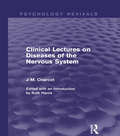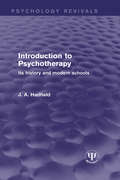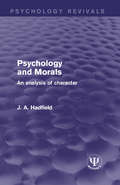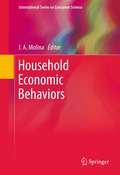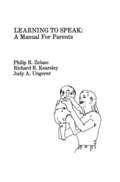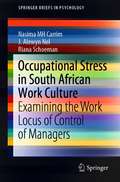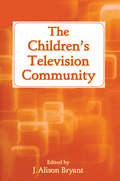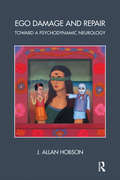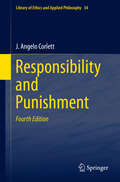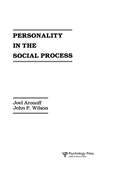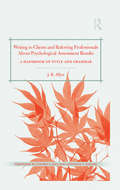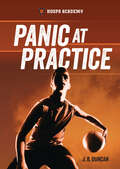- Table View
- List View
The Palgrave Handbook of Social Creativity Research (Palgrave Studies in Creativity and Culture)
by Vlad Petre Glăveanu Izabela LebudaThis Handbook brings together an international cast of experts to explore the social nature and context of creativity studies, focusing on methodology as a key component in advancing the social study of creativity. Two decades on from the pioneering work of Alfonso Montuori and Ronald E. Purser, the authors present a timely appraisal of past and present work in social creativity studies, and look ahead to future developments within this field. The authors collectively offer a rigorous examination of the methodological and empirical issues and techniques involved in studying social creativity. They examine the phenomenon as a form of communication and interaction within collaborative relationships; contending that creativity happens not within a vacuum but instead from a nexus of personal, social and contextual influences.This comprehensive work is organized in three parts, focusing first on the various methodological approaches applicable to the social in creativity studies. It secondly turns to empirical findings and approaches relating to the social nature of creativity. In the book’s final part, the authors offer reflections on the state of social research into creativity, pinpointing areas requiring further methodological scrutiny and empirical verification, and areas that may inspire further theoretical or applied work. Combining classic ideas with cutting-edge, emerging methods, this work provides a vital methodological ‘toolbox’ for investigators within social creativity.
Handbook of Occupational Health and Wellness
by Izabela Z. Schultz Robert J. GatchelThis book integrates the growing clinical research evidence related to the emerging transdisciplinary field of occupational health and wellness. It includes a wide range of important topics, ranging from current conceptual approaches to health and wellness in the workplace, to common problems in the workplace such as presenteeism/abstenteeism, common illnesses, job-related burnout, to prevention and intervention methods. It consists of five major parts. Part I, "Introduction and Overviews," provides an overview and critical evaluation of the emerging conceptual models that are currently driving the clinical research and practices in the field. This serves as the initial platform to help better understand the subsequent topics to be discussed. Part II, "Major Occupational Symptoms and Disorders," exposes the reader to the types of critical occupational health risks that have been well documented, as well as the financial and productivity losses associated with them. In Part III, "Evaluation of Occupational Causes and Risks to Workers' Health," a comprehensive evaluation of these risks and causes of such occupational health threats is provided. This leads to Part IV, "Prevention and Intervention Methods," which delineates methods to prevent or intervene with these potential occupational health issues. Part V, "Research, Evaluation, Diversity and Practice," concludes the book with the review of epidemiological, measurement, diversity, policy, and practice issues-with guidelines on changes that are needed to decrease the economic and health care impact of illnesses in the workplace, and recommendations for future. All chapters provide a balance among theoretical models, current best-practice guidelines, and evidence-based documentation of such models and guidelines. The contributors were carefully selected for their unique knowledge, as well as their ability to meaningfully present this information in a comprehensive manner. As such, this Handbook is of great interest and use to health care and rehabilitation professionals, management and human resource personnel, researchers and academicians alike.
Empirical Understanding of School Leaders’ Ethical Judgements: Applications of the Ethical Perspectives Instrument (Routledge Research in Educational Leadership)
by Izhak Berkovich Ori EyalThis volume offers a holistic, empirically grounded examination of the factors which influence educational leaders’ ethical judgments in their day-to-day work in schools. Drawing on a range of quantitative studies, the text utilizes organizational psychology to explore multiple ethical paradigms. It considers social aspects including ethnicity, gender, hegemony-minority relations, and leadership styles which influence and drive ethical judgment patterns employed by educators and principals. The book ultimately demonstrates the Ethical Perspectives Instrument (EPI) as an effective tool for the assessment of various ethical viewpoints and their interactions, suitable for application to diverse cultures and socio-educational circumstances. An important study of the leaders’ ethics and preparation in handling marginalized populations, this book will be valuable for academics, researchers, and graduate students working in the fields of educational leadership, organizational psychology, and the sociology of education.
Applying Bio-Measurements Methodologies in Science Education Research
by Iztok Devetak Saša Aleksij GlažarThis book illustrates the problems of using eye tracking technology and other bio-measurements in science education research. It examines the application of bio-measurements in researching cognitive processes, motivation for learning science concepts, and solving science problems. Most chapters of this book use the eye-tracking method, which enables following the focus of the students’ attention and drawing conclusions about the strategies they used to solve the problem. This book consists of a total of fifteen chapters. Authors from eight countries emphasise the same trends despite their cultural and educational differences. The book begins with general chapters describing cognitive processes and how these processes are measured using eye-tracking methods and other psychophysiology parameters and motivation. Finally, the book concludes the chapters presenting studies in specific scientific fields from chemistry, biology, physics and geology.
Proceedings of the 1st International Conference on Psychology and Health Issues (Advances in Health Sciences Research #66)
by Izzanil Hidayati Rizal Kurniawan Rahmadianti AuliaThis is an open access book.We are now heading into the era of society 5.0. The era of society 5.0 was developed by Japanese Government to describe the integration between physical and virtual spaces that can solve social problems. Many things in this era are run based on the concept of internet-based big data technology that will make human life easier. The effect of this era will be felt in various aspects of our lives such as health, education, transportation, industry, etc.If we look at Indonesia specifically, Indonesia is currently still in the era of 4.0. It can be seen in various fields, one of them is education field. Education in Indonesia currently already uses online learning method. However, for the 5.0 era, online learning method will use various technology-based educational tools. For this reason, it is important for educators to not only use technology in teaching but also focus and put attention on student’s character, moral, and discipline.Although there are so many benefits and positive aspects we will feel in the era of 5.0, we also need to open our eyes to the negative aspects that may occur when students are exposed to too much technology. The opportunity to get the freedom to access the internet and unlimited access of information can have negative impact on students such as game and social media addiction, cyber bullying, etc. These problems can have an impact to student’s mental health as we can find in several studies which say that “internet addiction has a tendency to make a person apathetic, addicted, and PTSD.Mental health is important because this kind of health is related to many aspects in human such as physical and cognitive functions. One of interesting topics related to this issue is how human cognitive functions, especially about the brain and nervous system in addiction and mental health issues which we called neuroscience.For these reasons, an international seminar entitled " INTERNATIONAL CONFERENCE ON PSYCHOLOGY AND HEALTH ISSUES” carries the theme advancement in health science and psychology for society 5.0.
Come avere successo nella tua nuova relazione di coppia
by Iñaki FernandezIl cuore capisce ragioni che le ragioni non capiscono…Fino a quando ci rendiamo conto che stiamo perdendo il nostro tempo e le nostre energie. E che… Chi non ha desiderato una volta nella vita avere una sfera magica per sapere se si sta comportando nel modo corretto nella sua relazione di coppia? Come possiamo sapere se abbiamo trovato il giusto compagno di viaggio? Se vale la pena insistere a prescindere dalle difficoltà? Oppure se è arrivato il momento di voltare pagina anche se ci può far soffrire moltissimo? Il dottor Iñaki Vázquez, psichiatra e terapeuta specializzato in relazioni di coppia, ci offre nel suo nuovo libro tutte quelle informazioni di cui avremo bisogno per identificare e capire se vale la pena continuare con la nostra relazione oppure se è arrivato il momento di voltare pagina. Tra le altre cose scoprirai: - Quali sono le chiavi che favoriscono il successo all’interno di una relazione (e come identificare se la tua le possiede). - Sé meglio innamorarsi “improvvisamente” o poco a poco. - Cos’è l’intimità e perché è tanto importante. - Le 3 cose che mantengono accesa la fiamma (si, il sesso è una di queste). - Le 5 “No Way!” o cose che dovrai a tutti i costi evitare. - Ad ascoltare te stessa ed avere ben chiaro che ti meriti una relazione che ti faccia diventare grande (e non piccola). Se ti preoccupa ripetere sempre gli stessi errori. Se sei single ed affronti con una certa paura la tua prossima relazione. Se ne hai appena iniziata una e ti senti insicura. O se ti senti intrappolata in una relazione che non avanza... In questo libro troverai tutti quegli strumenti di cui avrai bisogno per sapere se hai incontrato la persona giusta o ti conviene scappare a gambe levate. Scoprirai come rinforzare la tua autostima e ad avere più fiducia in te stessa, perché si, ti meriti una relazione che ti renda felice. "Ti ritrovi davanti ad un’opera, che dopo aver
Como acertar em sua nova relação de casal
by Iñaki FernandezO coração entende razões que a razão não entende... Até que nos damos conta de que estamos perdendo nosso tempo e nossas energias. E, afinal… Quem nunca desejou ter, em algum momento, uma bola mágica para saber se está acertando em sua relação de casal? Como saber se você encontrou seu companheiro de viajem? Se vale à pena perseverar a relação mesmo com as dificuldades? Ou se chegou o momento de virar a página definitivamente por mais que doa? O Doutor Iñaki Vázquez, psiquiatra e terapeuta especializado em relações de casal, nos oferece em seu novo livro todas as chaves que necessitamos para identificar se nossa relação vale a pena ou se chegou a hora de virar a página. Entre outras coisas você descobrirá: -Quais são as chaves que favorecem para que uma relação tenha sucesso (e como identificar se a sua possui). -Se é melhor se apaixonar “a primeira vista” ou pouco a pouco. -O que é a intimidade e por que é tão importante. -As 3 coisas que mantêm a chama acesa (sim, o sexo é uma delas). -As 5 “No Way!” ou coisas que você deveria evitar a todo custo. -A escutar a si mesma e ter muito claro que merece uma relação que te faça grande (e não pequena). Se você se preocupa em repetir sempre os mesmos padrões. Se você está solteira e encara com medo sua próxima relação. Se você acaba de começar uma e se sente insegura. Ou se você se sente presa em uma relação que não avança... Neste livro você encontrará as ferramentas que necessita para saber se encontrou a pessoa adequada ou se é conveniente sair correndo daí. Você descobrirá como reforçar a autoestima e confiança em si mesma porque, sim, você merece uma relação que te faça feliz. “Você está diante de uma obra que, depois de ler, considero ‘leitura obrigatória’ para todas as mulheres. Realmente te ajuda, mas não de qualquer forma. Além
Women, Families, and Feminist Politics: A Global Exploration
by J Dianne Garner Suzanne CherrinWomen and their roles within families must be understood within the context of ethnic traditions, religion, and culture. Women, Families, and Feminist Politics: A Global Exploration combines all of these aspects to evaluate the similarities and differences of women around the world. Readers will learn about diverse theories relating to women and their familial roles, the different categories of feminism, and how cultures and ethnic traditions shape and sometimes restrict a woman’s identity. Using feminist and sociocultural theories to critically examine the role of adult women within their families, Women, Families, and Feminist Politics offers ideas and suggestions on what has to be done in order for all of women’s experiences and concerns to be valued and looked upon as important. In addition to providing you with an understanding of how customs and cultures contribute to societal standards set for women, Women, Families, and Feminist Politics discusses several factors that contribute to the formation of women’s roles and identity, including: the economic situation of the family and the country in which the woman lives (a developed or developing country) cultural diversity in monogamous heterosexual marriage relations and specific marriage traditions, such as dowries family structures, such as nonnuclear, extended, polygamous, mixed religion relationships, mixed race relationships, or same-sex relationships reproduction and sexual standards in relation to religion, government policies, and world population gender equity in the workplace and programs for women in global development the health care needs of women and how they vary depending on culture, political philosophies, and resources women and violence in societal and family contexts, from war rapes, female circumcision, and footbinding to battery and sexual harassmentWomen, Families, and Feminist Politics looks at the daily challenges and concerns of adult women within the context of family to help you understand the different needs of women in relation to their culture and ethnic background. Focusing on the importance of views concerning the meaning of women’s social status, power, and success, Women, Families, and Feminist Politics contains case studies and statistical data that identify critical issues pertaining to you personally and to all women throughout the world. By understanding how women’s families help shape their identities, you will be able to learn about the vast experiences of women and the inequalities we have yet to overcome.
Eating Disorders: A Patient-Centered Approach
by Kathleen M Berg J Hurley Dermot James A McSherry Nancy E StrangeProviding a wide range of questions for all doctors wishing to take the Professional and Linguistics Board Test required for foreign nationals who want to practice in the UK, this title is a comprehensive primer for the examination. Presented in a workbook style, with spaces for the answers to be entered, it provides a wide range of questions examining over 1250 extended matching questions. It also includes contact details for key UK medical organizations and institutions and guidance to PLAB candidates from the General Medical Council.
Spiritual Crisis: Surviving Trauma to the Soul
by J Lebron McbrideIt’s no revelation that in today’s world many people suffer from some form of spiritual crisis. But, fortunately, there is hope. In Spiritual Crisis: Surviving Trauma to the Soul, you’ll discover how you can reverse the impact of spiritual crisis and apply healing balm to the traumatized soul. A comprehensive, real-life approach to spiritual care, it gives you the understanding necessary to put a lid on the daily chaos that seeks to destroy those whose lives have been shattered by tragedy, terror, and disillusionment.Written from the perspective of a compassionate professional who has navigated the dark and turbulent waters of his own spiritual crises, Spiritual Crisis represents a loving cross-section of aid from the fields of pastoral theology, psychology, and health care. Christians and non-Christians alike will benefit from its frank approach to aiding troubled souls through the tough times of belief transition, loss of faith, and potentially damaging extremes in living and thinking. Specifically, you’ll read about: understanding the effects and roots of spiritual crisis and trauma coping with loss counteracting disillusionment with the church negotiating belief transitions dealing with religious burnout intervening in denominational identity crisesOftentimes, it’s hard to know what will make a loved one survive or succumb to the impact of seemingly insurmountable personal emergencies. However, this book is a “call to care” that will enable you to help others turn back the tide of debilitating hardship in their lives and restore the tempering unity of mind and body. Whether you’re a beginning pastoral counselor, a marriage and family therapist, or friend of a troubled loved one, Spiritual Crisis will show you and those you work with how to turn crisis into care.
Substance Abuse: A Patient-Centered Approach
by Michael Floyd J Paul SealeSeries Editors: Moira Stewart, Judith Belle Brown and Thomas R Freeman Primary care clinicians are often unfamiliar with new and effective methods for detecting substance abuse problems in their earliest stages, and the majority of patients with substance abuse problems remain undiagnosed. Substance Abuse is written by primary care clinicians and focused to meet the needs of primary care providers, demonstrating how the patient-centered clinical method can assist clinicians in learning how to diagnose this complex psychosocial disorder. This book describes how to use state-of-the-art screening techniques, and how to understand and motivate patients to decrease or eliminate harmful use of alcohol and drugs. It presents the latest scientific findings and gives examples of using a patient-centered approach, as well as describing specific communication skills, with samples of dialogue illustrating their use in helping substance-abusing patients. This is essential reading for all family doctors, paediatricians, gynaecologists, psychiatrists, nurses, social workers, psychologists and all clinicians whose practices include substance abusing patients. It will also appeal to counsellors, education personnel and all professionals working with substance abusing individuals.
Attitudes and Decisions (Psychology Revivals)
by J Richard Eiser Joop van der PligtThe concept of attitude has long been a central part of social psychological theories. It is important in other disciplines too, such as economics, business studies, politics and sociology. Originally published in 1988, the authors of this text show how attitudes and motives are crucial in human decision-making, and explore the relationship between them. They look closely at the real context of people’s attitudes and behaviour, pointing out that attitudes are both a social product and an intrinsic part of social action. The authors show that theories of judgment, attitudes, attribution and decision-making can make important contributions to social issues such as the employment of nuclear energy, the storage of nuclear waste, health behaviour and medical decision-making. They emphasize that social psychology is relevant to a wide variety of social issues, deriving from the theoretical and distinctive methods that social psychology has developed.
Prospects for Immortality: A Sensible Search for Life after Death (Death, Value and Meaning Series)
by J Robert Adams"Prospects for Immortality: A Sensible Search for Life After Death" theorizes how matters concerning the birth of the universe, its ultimate fate, and the creation, evolution, and final destiny of life on earth co-exist with regenerated consciousness. Readers of this volume will be prompted to think about the basic concepts of life, death, and consciousness in a unique way. Written in a style that entertains and informs, author J. Robert Adams speculates on how the transfer of memory and consciousness into the hereafter occurs in conjunction with the physical, chemical, and historical facts already established by science.
Clinical Lectures on Diseases of the Nervous System: Delivered At The Infirmary Of La Salpetriere; Containing Eighty-six Woodcuts (classic Reprint) (Psychology Revivals)
by J-M. CharcotOriginally published in 1991 as part of the Tavistock Classics in the History of Psychiatry series, this re-edition of J-M. Charcot’s Clinical Lectures on Diseases of the Nervous System provides a unique opportunity to examine the work of one of the last century’s most controversial and admired physicians. Widely esteemed for his work in neuropathology, Charcot was also an innovator in the study of hysteria, making important contributions to its study in both women and men. The Clinical Lectures reproduced here are especially important for two key reasons. First, they provide insight into Charcot’s often neglected study of male hysteria, especially traumatic shock, as well as, hysteria among children. Secondly, they give an opportunity to examine his clinical method and style. His presentations and scholarly compilations greatly influenced an entire generation of French and other physicians interested in the study of the ‘unconscious’ during the turn of the century. The introduction, which precedes the work, places the volume in its social, political and historical context. It highlights the key features of the historiographical debate surrounding Charcot, which ranges in scope from the social and intellectual history of the Third Republic through that of early psychoanalysis. It then proceeds with an examination of the key themes – both substantive and methodological – underlying Charcot’s researches, providing both a general entrée into the history of medicine and society in this period, as well as an explication du texte which carefully analyses the lectures themselves.
Introduction to Psychotherapy: Its History and Modern Schools (Psychology Revivals)
by J. A. HadfieldFirst published in 1967, the original blurb reads: This book is intended to give the intelligent lay reader a comprehensive view of the subject of psychotherapy, the treatment of nervous disorders by mental means. These disorders are of increasing importance on account of their wide-spread nature and of the misery they produce. It describes the development of psychotherapy as employed by the most primitive peoples and races, through animal magnetism and hypnotism to the more modern analytical schools of Freud, Jung and Adler. It sets out in particular to give the positive contributions of these various systems, although this does not preclude criticism of their weaknesses and more dubious theories. Dr Hadfield has had the widest experience, having treated psychoneurotic disorders for over fifty years, including the war neuroses in the two world wars, both in the Navy and in the Army; and, as Lecturer in the University of London in the subject for over forty years, he has had the opportunity to systematize the knowledge thus obtained. As a result of this experience he has come to conclusions as to the nature, causes and treatment of such disorders differing somewhat from those of the established Schools, and it is these findings which are given in the latter part of the book under the title, ‘Direct Reductive Analysis’. The book will be useful to all those – teachers and parsons as well as medicals – who have to deal with human beings and their aberrations, and to them it is addressed.
Psychology and Morals: An Analysis of Character (Psychology Revivals)
by J. A. HadfieldOriginally published in 1923, this book had enjoyed constant and wide success, being reprinted fourteen times. In this new and thoroughly revised edition, published in 1964, the author has reconsidered his conclusions in the light of modern psychology of the time, and includes many case histories from his long experience as a psychiatrist. The book was important for its insistence that there is no intrinsic conflict between analytical psychotherapy and ordinary moral behaviour.
Household Economic Behaviors
by J. A. MolinaSignificant recent changes in the structure and composition of households make the study of the economic relationships within the household of particular interest for academics and policy-makers. In this context, Household Economic Behaviors, through its focus on theoretical and empirical chapters on a range of economic behaviors within the household, provides a new and timely viewpoint. Following the Introduction and one or two surveys which give a general background, the volume includes theoretical and empirical perspectives on allocation of available time within the household, monetary and non-monetary transfers between household members, and intra-household bargaining.
Learning To Speak: A Manual for Parents
by P. R. Zelazo R. B. Kearsley J. A. UngererFirst published in 1984. Routledge is an imprint of Taylor & Francis, an informa company.
Occupational Stress in South African Work Culture: Examining the Work Locus of Control of Managers (SpringerBriefs in Psychology)
by Nasima MH Carrim J. Alewyn Nel Riana SchoemanThis book explores avenues for organisations to better understand the origins of occupational stress so as to enable their managerial employees to effectively manage stress levels. By way of the work locus of control as a personality variable, the book identifies stressors both within and outside the organisation that underpin high stress levels in organisational culture. In grappling with what is required in the new workforce of ‘Generation Y’ millennials in a hyper-networked and mobile age, the authors present examples from everyday professional situations in South Africa to contribute to critical understanding of today’s working world. By applying neuroscientific principles developed from a foundation of empirical research, the authors introduce the concepts of a 'red zone’ and ‘blue zone' to explain differences between the brain areas controlled either by its stem-limbic areas, or the limbic-cortical cortex areas, respectively. This becomes a psychological shorthand for describing and applying knowledge to encourage practitioners in leadership and management roles to achieve desired behaviour outcomes, and to establish a framework for understanding employee values and worldviews. The book is relevant to practitioners, postgraduate students and researchers interested in industrial psychology, personality psychology, business management and human resources.
The Children's Television Community (Routledge Communication Series)
by J. Alison BryantThe Children’s Television Community presents a cutting-edge analysis of the children’s television community—the organizations, major players, and approaches to programming—and gives an overview of the history, current state, and future of children’s programming. Leading children’s television professionals and distinguished academicians come together in this volume to take a distinctive behind-the-scenes look at how children’s television is created, programmed, and sold. This thought-provoking work emphasizes the various actors whose creative, financial, political, and critical input go into children’s television, and addresses advocacy for children’s television from multiple approaches. By blending these diverse perspectives, editor J. Alison Bryant offers readers a comprehensive picture of children’s television. Highlights include:* a community level approach to understanding children’s television;* perspectives from colleagues in various aspects of the media industry; and* an eye-opening analysis of how decision-making affects what children are exposed to through television. The Children’s Television Community is highly informative for educators, industry professionals, and practitioners in media, developmental psychology, and education.
Ego Damage and Repair: Toward a Psychodynamic Neurology
by J. Allan HobsonAs a psychiatric trainee at Harvard in the early 1960s, Dr Allan Hobson was taught commitment to psychoanalytic theory that was already suspect and is now almost entirely obsolete. Via a series of clinical case reports, the author first apologizes for the arrogant ignorance that he adopted from his teachers and then replaces Freudian doctrine with a scientific alternative called Psychodynamic Neurology. The new approach is solidly grounded in sleep and dream science and restores hypnosis to its rightful place in the therapeutic armamentarium. A central precept of Ego Damage and Repair is that the self and its subjective experience (including symptoms) are natural accompaniments of spontaneous and prenatal brain activation that persists throughout life as REM sleep dreaming. Far from being the nonsense theory that psychoanalytic opponents mock, Psychodynamic Neurology views the unconscious as a hyper-meaningful set of predictions about the world that constitutes a virtual reality model which is continuously updated by personal experience. To showcase the changes in psychotherapeutic practice that are recommended, the self treatment of Dr Glen Just is described in detail.
Responsibility and Punishment
by J. Angelo CorlettThis volume provides discussions of both the concept of responsibility and of punishment, and of both individual and collective responsibility. It provides in-depth Socratic and Kantian bases for a new version of retributivism, and defends that version against the main criticisms that have been raised against retributivism in general. It includes chapters on criminal recidivism and capital punishment, as well as one on forgiveness, apology and punishment that is congruent with the basic precepts of the new retributivism defended therein. Finally, chapters on corporate responsibility and punishment are included, with a closing chapter on holding the U. S. accountable for its most recent invasion and occupation of Iraq. The book is well-focused but also presents the widest ranging set of topics of any book of its kind as it demonstrates how the concepts of responsibility and punishment apply to some of the most important problems of our time. "This is one of the best books on punishment, and the Fourth Edition continues its tradition of excellence. The book connects punishment importantly to moral responsibility and desert, and it is comprehensive in its scope, both addressing abstract, theoretical issues and applied issues as well. The topics treated include collective responsibility, apology, forgiveness, capital punishment, and war crimes. Highly recommended. "--John Martin Fischer, Distinguished Professor of Philosophy, University of California, Riverside.
Personality in the Social Process
by J. P. Wilson J. AronoffFirst published in 1985. This book presents a new way to ask an old question. Many fields have considered the nature of the influence that members of a group exert on the course of social events. Social science provides another way to examine this issue. Moreover, social science has a particular strength: It helps us to phrase questions more precisely than before, it encourages us to follow a line of reasoning systematically, and it requires us to evaluate our ideas in light of a particular kind of evidence. The authors want to use these strengths to explore systematically the ways that factors in the person and in the environment together may shape the emergence of social behavior.
Writing to Clients and Referring Professionals about Psychological Assessment Results: A Handbook of Style and Grammar
by J. B. AllynThis book is the first on the craft of effective writing structured expressly for the psychologist-assessor. Author J. B. Allyn, a professional writer who specializes in psychology, combines reference book with tutorial. She blends information on the qualities that create a writer’s unique presence on the page with illustrations of correct English grammar. All of the questions, answers, and illustrations evolved from the concerns of psychologist-assessors, as did the examples, which are grounded in their writing and communication needs. The result creates a guide for report writing that can be used by either practicing professionals or graduate psychology students.The book divides into three sections: The first and third sections discuss various aspects of effective communication, while the second is a handbook of common grammar problems. Helpful elements guide the reader through the text, including frequent bullet lists, tables and graphs, and grammar and style examples that are framed around assessment reports. It is also written in a conversational tone, which creates the same style it proposes for effectively written reports, and is a key tool for clear and appropriate communication. Readers will refer back to this book, both for quick tips on style and grammar, which are appropriate for any mental health practitioner, and for more detailed advice on writing and communication in assessment reports.
Panic at Practice (Hoops Academy)
by J. B. DuncanSchool, homework, and basketball keep Tomás pretty busy. On top of everything, his dad is in the hospital, and it might be serious. It isn’t long before the pressure gets to be too much for Tomás and starts to affect his health. Will he be able to find a balance . . . and do it before his basketball season is in jeopardy?
